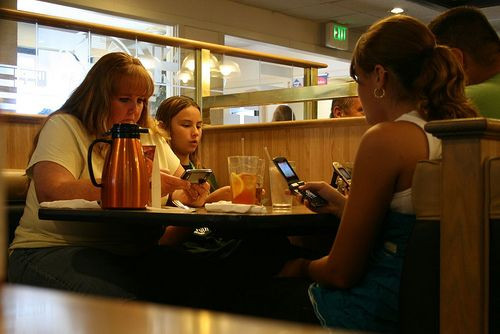20% Of Adults Use Smartphones During Sex: How Can Cell Phones Hurt Our Relationships?

The proliferation of smartphones has now reached almost total saturation. It may even be more accurate to call phones without a data plan "dumb" and make "smartphones" the default. Now the technology has begun its invasion into the final frontier. According to a new set of surveys, one in five American adults between ages 18 and 34 now uses his or her smartphone during sex.
How, exactly, people are using the device during sex is unknown. But what's clearer are its macro impacts on our social relationships. People not only use smartphones more frequently; they're also changing the environments in which they use them. The sheer pervasiveness has led to a world where three out of four people report having their cell phone within five feet of them at all times, according to the surveys.
Led by Harris Interactive, a survey conducted by Jumio found that vast quantities of people use their smartphones in a variety of social, and personal, situations. The most frequently reported circumstance to use a smartphone was, by and large, while driving. A full 55 percent of the 1,102 respondents said they've operated a car and smartphone at the same time.
"Although some of us may think these places are inappropriate for mobile phone usage, a number of Americans still embrace their phones in the following places," the survey's press release states. More than a third have used it in a movie theater, 32 percent while at a child's/school function, and exactly one-third reported using a smartphone on a date.
The Impact On Our Social Lives
Using a smartphone on a date has an especially curious effect, one study finds. And it can have far larger implications for how we conceive of our social world.
Published in the Journal of Social and Personal Relationships, the study conducted two sets of experiments in which participants carried out both an intimate and casual conversation — a discussion over plastic trees versus the year's most important events. Some pairs engaged in conversation while a notebook lay nearby, while others carried out with the notebook replaced by a cell phone.
Researchers Andrew K. Przybylski and Netta Weinstein, based out of the University of Essex, found overwhelming contrasts between the two contexts. The cell phone context showed no discernible difference in measures of trust with the dialogue partner, empathy, or quality of the conversation in casual matters. The intimate conversations, however — while wholly qualitative — showed significant declines in these metrics when a cell phone was present.
"These results demonstrate that the presence of mobile phones can interfere with human relationships, an effect that is most clear when individuals are discussing personally meaningful topics," wrote the researchers.
Now, consider the 33 percent of people using a smartphone while on a date. Depending on the stage of the relationship, each person's personality, or the seriousness of the conversation, the mere presence of a cell phone — devoid of any interaction with it — can sully a person's impression of the entire evening.
"The new research suggests that cell phones may serve as a reminder of the wider network to which we could connect, inhibiting our ability to connect with the people right next to us," wrote Dr. Helen Lee Lin in Scientific American.
Attached At The Hip
In addition to in the car and under the sheets, Jumio's survey shows people use their smartphones in church/places of worship 19 percent of the time, in the shower 12 percent of the time, and, across all adults surveyed, in the bedroom nine percent of the time.
"People view their smartphones as an extension of themselves, taking them everywhere they go," said Marc Barach, chief marketing and strategy officer at Jumio, in a statement, "even the most unorthodox places - from the shower to their commute, from the dinner table to the bedroom."
"It's no wonder people in relationships feel like their phones are cramping their love life," the press release added. "12% of respondents in a relationship said they believe their smart phone gets in the way of that relationship."
Source: Przybylski A, Weinstein N. Can you connect with me now? How the presence of mobile communication technology influences face-to-face conversation quality. Journal of Social and Personal Relationships. 2013.



























